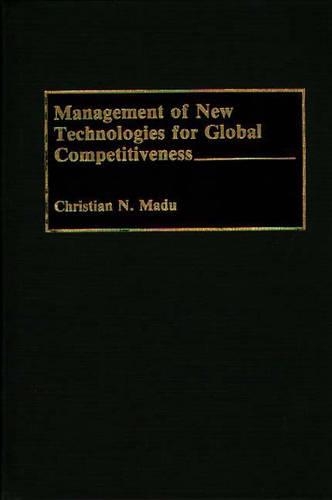
Management of New Technologies for Global Competitiveness
(Hardback)
Publishing Details
Management of New Technologies for Global Competitiveness
By (Author) Christian Madu
Bloomsbury Publishing PLC
Praeger Publishers Inc
30th June 1993
United States
Classifications
Tertiary Education
Non Fiction
Computer science
658.5
Physical Properties
Hardback
400
Description
Productivity, quality and competitiveness are all related to technology. Japanese corporations' success in achieving quality management have impelled the US executives to listen and re-evaluate their management practices. Increasingly, many managers believe that new advanced technologies can contribute to improving the productivity, quality and competitiveness of a firm. However, simply adopting a new technology will not put an end to productivity and/or quality problems. This fact is most apparent in the case of computer-integrated manufacturing. The "islands of automation" that have resulted convinced many that effective management of new technologies is necessary in order to exploit any potential benefits. This book focuses on efficient management techniques and looks at the critical areas that can enhance the performance of a firm as a result of the adoption of new technologies. The book is divided into five sections: the total quality management section contains four chapters that present a comparison between the Japanese and American production practices. The role of human resources and the US management practice is studied in depth. This section also presents a new way to measure the performance of a firm - not just by the direct quality of the product or service produced, but also by the sensitivity and responsibility of the firm to environmental and green issues. Other strategies for global competitiveness are also identified. The selection and implementation of new technologies section discusses the problems associated with the cost-accounting techniques in justifying new technologies and uses a multicriteria decision framework to show how this decision could be made. The strategic management section presents issues in production innovation and performance as well as the management of innovative technologies. The knowledge-based techniques section presents two chapters that investigate the role of artificial intelligence and expert systems in the management of new technologies. Finally, the advanced technologies section discusses the role of product design and reduced lot sizes in achieving a competitive advantage.
Reviews
For students who are researching the impact of new technologies and practitioners who are impacted by new technologies this book offers a strong introduction to the subject....the collection of articles in this book present a good reference source for both teaching and practicing the principles technology management and operations management.-The Southern Business & Economics Journal
"For students who are researching the impact of new technologies and practitioners who are impacted by new technologies this book offers a strong introduction to the subject....the collection of articles in this book present a good reference source for both teaching and practicing the principles technology management and operations management."-The Southern Business & Economics Journal
Author Bio
CHRISTIAN N. MADU is Professor and Program Chair of Management Science at the Lubin School of Business, Pace University. He has published over forty articles on different aspects of technology management in journals such as Decision Sciences, IIE Transactions, Journal of Operational Research Society, Technological Forecasting and Social Change, and several others. He is also the author of Strategic Planning in Technology Transfer to Less Developed Countries (Quorum Books, 1992), among others.
